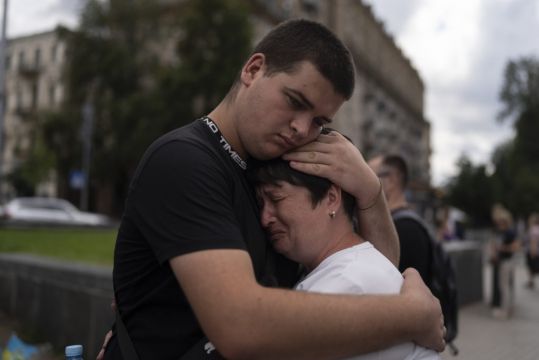Ukraine’s President Volodymyr Zelensky has signed a law moving the country’s official Christmas Day holiday to December 25 from January 7 – the day the Russian Orthodox Church observes it.
An explanatory note attached to the law said its goal is to “abandon the Russian heritage”, including that of “imposing the celebration of Christmas” on January 7, and cited Ukrainians’ “relentless, successful struggle for their identity” and “the desire of all Ukrainians to live their lives with their own traditions, holidays”, fuelled by Russia’s 17-month-old war on the country.
Last year, some Ukrainians observed Christmas on December 25 in a gesture representing separation from Russia, its culture and religious traditions.
The law also moves the Day of Ukrainian Statehood to July 15 from July 28, and the Day of Defenders of Ukraine to October 1 from October 14.
The Russian Orthodox Church, which claims sovereignty over Orthodoxy in Ukraine, and some other Eastern Orthodox churches continue to use the ancient Julian calendar.
Today is the anniversary of Olenivka, one of the most vile and cruel crimes of 🇷🇺. The deliberate, pre-planned killing of captured Azov warriors.
Let every loss of 🇷🇺 be retribution for its evil, and let every occupier, every Russian murderer, all those responsible for this… pic.twitter.com/k8yS3MP0KB— Володимир Зеленський (@ZelenskyyUa) July 29, 2023
Christmas falls 13 days later on that calendar than it does on the Gregorian calendar used by most church and secular groups.
The Catholic Church first adopted the modern, more astronomically precise Gregorian calendar in the 16th century.
Protestants and some Orthodox churches have since aligned their own calendars for the purpose of calculating Christmas and Easter.
Ukraine’s religious landscape has been fractured for years.
There are two branches of Orthodox Christianity in the country, one aligned with the Russian church, even as it enjoys broad autonomy, the other completely independent of it.
The Orthodox Church of Ukraine, the branch separate from the Russian church, announced earlier this year it was switching to the Revised Julian calendar, which marks Christmas on December 25.
Russia's withdrawal from the Black Sea Grain Initiative has decreased the supply of grain onto global markets and destabilised global food prices.
Russia is now using some of its best weaponry to target infrastructure housing and transporting grain.#FoodIsNotAWeapon pic.twitter.com/r8Fk9Vb3tvAdvertisement— Ministry of Defence 🇬🇧 (@DefenceHQ) July 29, 2023
Its leadership last year allowed believers to celebrate the holiday on December 25.
Russia’s state news agency RIA Novosti said on Saturday the rival Orthodox Church, which is aligned with the Russian Orthodox Church, vowed to continue observing Christmas on January 7.
Mr Zelensky on Saturday travelled to the war-torn Donetsk region in eastern Ukraine, which Russia has illegally annexed but only partially occupies, and met with members of the country’s Special Operation Forces.
Mr Zelensky noted in an online statement that Saturday marks their official day of recognition and also the anniversary of the deadly attack on the Olenivka prison in the Russian-held part of the region in which dozens of prisoners of war were killed.
Russia and Ukraine accused each other of the attack, with both sides saying the assault was premeditated in a bid to cover up atrocities.
Latest Defence Intelligence update on the situation in Ukraine - 29 July 2023.
Find out more about Defence Intelligence's use of language: https://t.co/fMz5G0zMCP
🇺🇦 #StandWithUkraine 🇺🇦 pic.twitter.com/40214yywD6— Ministry of Defence 🇬🇧 (@DefenceHQ) July 29, 2023
A United Nations fact-finding mission requested by Russia and Ukraine was sent to investigate the killings but the team was disbanded in January 2023 due to security concerns.
In a video statement on Saturday, Mr Zelensky described the attack as one of Russia’s “most vile and cruel crimes”.







